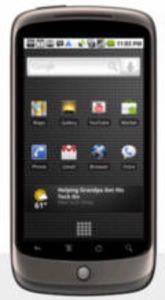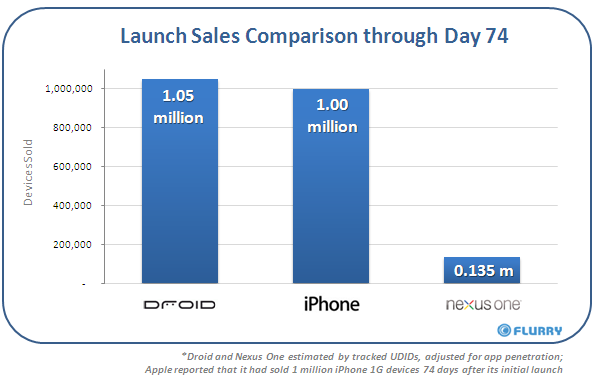A new report from mobile analytics firm Flurry reveals some interesting numbers about Google’s first attempt to sell its own custom branded Android device, an HTC-built phone called the Nexus One. It’s a flop. After 74 days, the same amount of time it took the original iPhone to sell its first million units, the Nexus One sold only 135,000.

But before you read too much into these numbers, thinking that it has any meaning with regard to the Android ecosystem as a whole, think again. Android market share is growing fast – it more than doubled from September to December of last year, for example. Oh, and the Droid, Android’s fastest-selling phone to date? It actually beat the iPhone by day 74, Flurry says. All this new data shows is that Google is no Apple when it comes to marketing their own device.
iPhone Killer? Hardly
In January of this year, Google hosted a press event to showcase its new Nexus One phone, a HTC device sold exclusively by Google on its own website in both a carrier-specific and unlocked version. When asked if the new phone was meant to be an iPhone killer, Google Director of Mobile Platforms Andy Rubin simply replied that “choice is a good thing.”
Prior to its launch, many technology insiders suspected (or rather, hoped) that the new “Google phone” would be exactly that – a killer, the first real rival to challenge Apple’s dominance in the smartphone market. With features like support for multitasking, Google’s own GPS navigation application, Google Voice (the VoIP app Apple banned from iTunes), a 3D photo gallery and, of course, heavy integration of Google services, the Nexus One had a feature lineup that Apple’s iPhone couldn’t beat.

Why Did the N1 Flop?
So what happened? Why don’t the sales numbers match up with the excitement surrounding the device? The problem likely has to do with the fact that the phone is sold online only. You can’t march into a store and purchase a Nexus One and, apparently, that’s how most customers want to shop. Another problem is that the U.S. carrier for the N1 is T-Mobile, a much smaller network than either AT&T (iPhone) or Verizon (Droid). Also, the N1 isn’t available worldwide like the iPhone is.
However, don’t count the N1 out just yet. According to Google’s website, it will arrive on Vodafone in Europe by spring 2010, and, in the U.S., Verizon will get a version of the device at the same time. Given how well the Droid has done for Verizon, the Nexus One may have a shot at boosting its sales soon.
Meanwhile, Android, as a platform, is doing quite well even if the Nexus One isn’t. The Droid recently became the fastest-selling Android phone to date, beating myTouch 3G sales by more than four times; the Android market share has been growing by leaps and bounds; Android’s application store is now the second largest, second only to Apple’s iTunes; and, finally, some companies found their Android website visitors increasing by as much as 350% over the past year.
In the end, the Nexus One may not have succeeded the way Google had hoped, but clearly, Android itself has.

















